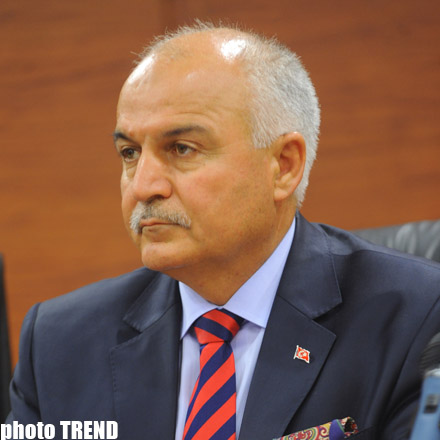Azerbaijan, Baku, Sept. 17 /Trend, U.Sadikhova/
This week's tenth summit of Turkic-speaking states' leaders in Istanbul once again demonstrated the support that Azerbaijan enjoys in the restoration of its territorial integrity, said Mustafa Kavakchi, Turkish MP from the ruling Justice and Development Party.
"The summit of Turkic-speaking states was held in order to resolve common problems, one of which is the Nagorno-Karabakh conflict. The world was once again convinced that Azerbaijan is not alone in this regard," Kavakchi, chairman of the Azerbaijani-Turkish parliamentary friendship group, told Trend by telephone from Ankara. All countries that participated in the summit and joined the Council of Turkic-speaking countries support Azerbaijan."
An agreement was signed to establish the Cooperation Council of Turkic-speaking countries within the one-day summit of Turkic states' leaders. Kazakh President Nursultan Nazarbayev initiated the establishing of the organization at a summit in Antalya in 2006. A forum in Nakhchivan three years later resulted in the signing of an agreement to establish the new international structure. The CCTC will be the basis for a new regional Turkic union, which is designed to strengthen the unity of peoples with similar languages and cultures environment, and to strengthen their political and trade relations.
According to the Turkish MP, the summit in Istanbul once again proved that the countries that have the same roots and speak in related languages should gather to solve the existing common problems, but not pursuing the indirect targets.
"The summit of Turkic-speaking states was conducted not in opposition to other countries and is not directed against other regional states, but became a step forwards solving common problems of the Turkic world to prevent violence," said Kavakchi.
Turkish MP believes that the Council of Turkic-speaking states will be able to create a framework for addressing the problems of each country, including the occupation of Azerbaijani lands.
The conflict between the two South Caucasus countries began in 1988 when Armenia made territorial claims against Azerbaijan. Armenian armed forces have occupied 20 percent of Azerbaijan since 1992, including the Nagorno-Karabakh region and seven surrounding districts.
Azerbaijan and Armenia signed a ceasefire agreement in 1994. The co-chairs of the OSCE Minsk Group - Russia, France, and the U.S. - are currently holding the peace negotiations.
Armenia has not yet implemented the UN Security Council's four resolutions on the liberation of the Nagorno-Karabakh and the surrounding regions.






